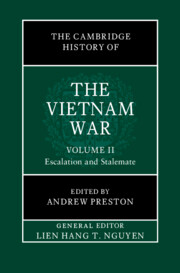Book contents
- The Cambridge History of the Vietnam War
- The Cambridge History of the Vietnam War
- The Cambridge History of the Vietnam War
- Copyright page
- Contents
- Figures
- Maps
- Tables
- Contributors to Volume II
- General Introduction
- Introduction
- Part I Battlefields
- Part II Homefronts
- Part III Global Vietnam
- 24 International Radicalism and Antiwar Protest
- 25 The Vietnam War and the Sino-Soviet Split
- 26 Western Europe and the Vietnam War
- 27 International Peace Initiatives
- 28 Japan and the Vietnam War
- 29 The Economics of the Vietnam War
- 30 Vietnam and the Global 1968
- Index
24 - International Radicalism and Antiwar Protest
from Part III - Global Vietnam
Published online by Cambridge University Press: 02 January 2025
- The Cambridge History of the Vietnam War
- The Cambridge History of the Vietnam War
- The Cambridge History of the Vietnam War
- Copyright page
- Contents
- Figures
- Maps
- Tables
- Contributors to Volume II
- General Introduction
- Introduction
- Part I Battlefields
- Part II Homefronts
- Part III Global Vietnam
- 24 International Radicalism and Antiwar Protest
- 25 The Vietnam War and the Sino-Soviet Split
- 26 Western Europe and the Vietnam War
- 27 International Peace Initiatives
- 28 Japan and the Vietnam War
- 29 The Economics of the Vietnam War
- 30 Vietnam and the Global 1968
- Index
Summary
Drawing on the burgeoning scholarship on the Global 1960s, this chapter argues that the Vietnam War was a key historic event that internationalized radical social movements. The war did so in three main ways. First, through the conflict, activists in different parts of the world formed a global public sphere. Opposition to the war helped to transcend Cold War and colonial divisions, but the political movements that emerged resonated differently through various parts of the First, Second, and Third Worlds. Second, resistance against the Vietnam War fostered internationalism by foregrounding the agency of the marginalized. The war featured a David versus Goliath competition between a presumably backward, peasant society against the mightiest military in the world. Third, the wars in Southeast Asia helped to internationalize antiwar resistance by illuminating the interconnectedness of various systems of inequality. Imperialism and colonization became part of the activist lexicon, utilized to interpret cultural, racial, class, gender, and other forms of exploitation. The chapter concludes by reflecting on the agency of the Democratic Republic of Vietnam and the National Liberation Front in consciously cultivating these antiwar internationalist affiliates.
Keywords
- Type
- Chapter
- Information
- The Cambridge History of the Vietnam War , pp. 509 - 528Publisher: Cambridge University PressPrint publication year: 2024

